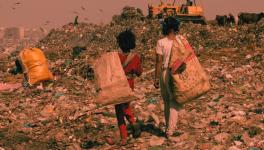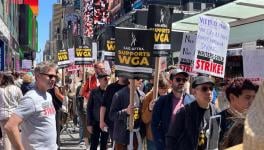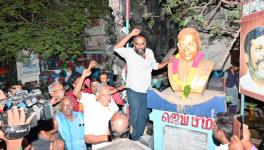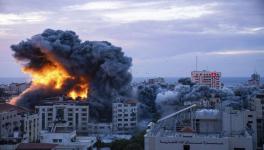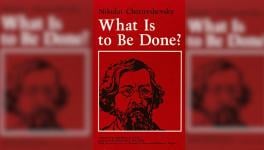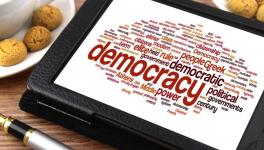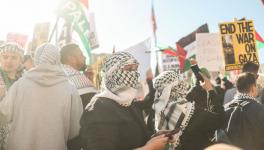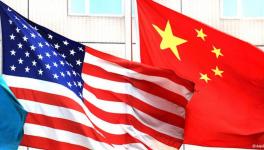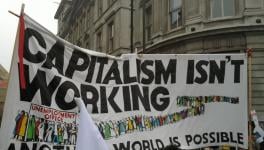Interview With Wamba Dia Wamba, Part I
During the Pan Africanism Today Congress in Zambia, María Torrellas interviewed Ernest Wamba Dia Wamba, senator of The Democratic Republic of Congo. He was the President of the Congolese Rally for Democracy against Kabila in 1998. Also he is a professor, historian and militant of the social movement Mbongi A Nsi.
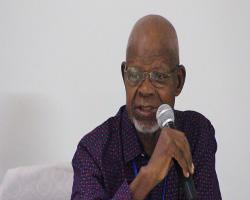
The crime of Congolese Hero Patrice Lumumba
– You were talking this morning in this conference about the situation in your country and you outlined the post-colonialist struggle. Could you tell me, shortly, about the murder of Lumumba? And how did he change everything for Congo in those days?
Lumumba became radicalized in a very short period of time. He went from being someone who was arguing in terms of having a Belgo-Congolese community, to a nationalist who wanted to really change the Congo and correct all the colonial conditions of life. The mistake was that he exposed his program in front of the enemies before most of the people of the Congo had internalized the program. So, the enemies attacked him and the people were not able to protect him. Eventually, he found out that even the people he had been working with, became his enemies and were won over the other side of the enemies. So that’s what led him to be killed. In fact he was killed not by Congolese, he was killed by Belgians: by two Belgian policemen working for Tshombe, who cut him into pieces, and put the pieces into acid to dissolve the whole body, so that there wouldn’t be any shrine where people could go to pay respect to Lumumba. That’s how Lumumba got killed. He loved his country, he stood for real independence of the country and real transformation in favour of the people. So, for those who didn’t want true independence, who were just decolonizing to fool the people, they didn’t like this, because they had a lot at stake, a lot to lose. Decolonization meant that you replace the whites but the privileges remain: and now they were saying, no, we can’t have the others having privileges and the masses starving, we want resources to be used for the people and the others were of course hostile to the idea.
– After Lumumba, there came a post colonial government, but even then you had very hard times when trying to build socialism. What happened afterwards?
When Lumumba dies, those who took over had the same similar ideas, to organize themselves in a national movement for the second independence. They said that the first independence was fake and they wanted real independence. They took up arms and at some point they occupied part of the country, but eventually, also with the intervention of Belgians and the intervention of the US, they were defeated. But after that defeat, some also took up arms again, hoping to have an armed struggle coming from the rural area, and before they reached the city a person like Pierre Mulele, who spent some time in China, sometime in Egypt, when the nazis were in Belgium too, he again took over to set up a movement to have real independence. It’s in that moment that Che Guevara comes, but unfortunately Che Guevara goes to the East and doesn’t reach Pierre Mulele, who was in the West. He wanted to connect but the country is very huge. So the group he was connected with, eventually, also was defeated, Mulele’s group was also defeated, and in fact, he was killed almost in the same way Lumumba was killed. Piece by piece, killing him, piece by piece, you cut the ears, you take off the eyes, you ask him to give a speech, you cut the lips, until eventually you cut the body into pieces, you put it in a sack and you throw it into a river. That’s how Pierre Mulele died.
After such horrendous actions, do the people want to fight for independence?
Yes, after that you still had people who wanted to continue to fight for a real independence. But each time, the other side always had a much stronger backing than those who wanted to have real independence. The last armed struggle, the last rebellion, took place and just ended by 2003. I have the feeling that the way things are going, people are in a very very dire situation, for example you have 89% of people of living under the poverty line, 86% of people can’t work, who have no work, you have a majority with no access to decent medical attention, the schools are in crisis, while the minority working for multinationals, working in alignment with (especially) the Western world, enjoy themselves. Very soon some are again going to see how they can reverse this situation. So, almost everything has been attempted, you know, it was attempted through the elections and there were problems with elections. The last electionary process was just fraudulent, even the Carter Institute testified that these were fraudulent elections. Now elections are coming but one has the feeling that since they are not doing the preparations the way they should be done —the list of electors is full with names of people who died already, some names you can’t even trace where they come from… If this list they use is already fraudulent, people are asking for a new list, a news census, to be done, especially for those who have became now able to vote, but the government says there is no money, now they say there is no time, because if we do that we would have to go beyond the date of the mandate. So, because of this blockade, people are tired. My feeling is that there is going to be probably an uprising, and what will come next is very difficult to say.
The rebellion of 1998 against Kabila
– You were part of the 1998 rebellion. What are the lessons of that experience?
Well I was drawn to this rebellion and end up being elected as the leader of it. Now, very very soon we realized that in fact there were two tendencies in the rebellion. One tendency can be called “militarist”, these are the people saying that we should go and military take over first and then we would examine if we were going to have a democracy. And there was a tendency that was saying that even in the rebellion we have to be elected by people in a democratic way, so that the rebellion is not just militarist but also the people’s base to rebel. That was my tendency. So we got split into two. My tendency continued and the other one continued their line until at some point we had confrontations. A war between the two guerrillas. But it was a war more or less provoked by the allies of the different camps and these allies were fighting of the control of the diamond monopoly. The militarist group wanted the monopoly the diamond mining.
– Who supported them?
Rwanda. Then you had our group, and our allies were the Ugandans who also wanted the monopoly of diamond. My group were arguing that we needed free market. The GOMA group (the militarist), in fact, had a list of people that had to be killed, 20 of my comrades. Fortunately they couldn’t kill us, we managed to escape. We removed from the city and when they stayed they continued to have twice the confrontation, between the two, Uganda and Rwanda. So, the lessons were that.
– So the two parts were defeated?
I can’t say defeat. But we split and went to a different place and the others stayed in the same place. The only rebellion that probably could be successful must be strictly a people-based rebellion without a military or allied intervention. Because, for example, they were supporting you and then you discover that in fact they were only interested in resources. So, strictly, if we are going to have an armed struggle it should be among our people. If they are going to be people supporting from the outside, the support shouldn’t be in terms of military personnel, no. It has to be in terms of maybe other sort of material or media, diplomatic support, you know, as a back front. I was personally supported more by Tanzania but Tanzania didn’t have troops with us. Those supported by Uganda, well, Uganda had troops, as our allies. And the Rwandans were supporting the group based in GOMA.
At the end because of this confrontation, internationally there was a public cry and we had to end up with negotiations, the Inter-Congolese Dialogue: unfortunately instead of Congolese people talking to each other it became an international facilitation that decided to make it short and that the dialogue was going to be about power sharing, in terms of who is likely to threaten peace, and who is likely to be in favour of peace. Those who were in favour of peace, they were already committed. So they get of a less share in power. Those who had armies that might had been threatening to begin conflict again, got more power. So that’s how they divided. We end up with an elephant government with 1 President and 4 Vice Presidents. They called it “the government of 1 plus 4”. We had a presidency of 5 people.
And then, there was a three-year transition, and I was in the Senate where we drafted the Constitution, at least we did the draft only later to learn that another draft had come from Belgium and that draft eventually got voted in a referendum and there were all kind of other irregularities. For example, you printed the text of the Constitution on Saturday and on Sunday we had the referendum. So this means that hardly less than one percent of the people had gone through the text and then, among the printed copies there were 4 different variants of the text: maybe one article was not matching, this sort of things. In fact, in the place where I voted for the referendum there was a woman who came, a very smart woman, and she asked: “Where is the picture of Mr. Referendum?” And someone answered “Referendum is not a person”. And she said: “For me, I have to see who I’m voting for”. And they answered: “It’s not a person” And she said “Who are we voting for?”. -“You are voting for the law, you know, for the Constitutional law of the land” -“But we haven’t even seen it, is there a text?”. And they said – “Oh yes, the text will be given to you later, but now just vote” (laughs). So that’s how the voting went.
– At the end, when it finished, another government came?
The Constitution was adopted so afterwards, there were elections. The electoral law said those who are candidates for the presidency must deposit 50,000 dollars, this money can’t go back to you, —although they said it was a deposit you couldn’t get it back, it went into the treasury, and, as it turns out, the treasury was just one person (laughs). So, I didn’t participate, because it didn’t make sense to me.
– So, after the negotiation, the guerrilla fighters didn’t go to jail right? because there had been a negotiation.
Yes, there were negotiations, so we were supposed to have truth and reconciliation, which hardly took place, anyway. The way they divided the power sharing, some of the militarist were given the control of defense and security. Others were given control of social services. And one of the major rebel group was given finances. And that’s how it ended. There’s nowhere you can go to say now “you are a criminal”, but I’m sure that after there is a real change in leadership, some justice will have to be seen to be done.
– After that came the current government, with all that poverty and injustice.
Yes, that is the current government. First, there was the drafting of the Constitution, where we said that the minimum age for a candidate for the presidency had to be 40 years. The international committee, the international group, had already decided on a candidate, which is the current President, who at the time was not yet 40 years old. So they asked to amend the Constitution to write 30 years instead of 40. So, that was the first change. Then, after the election in 2006, after 5 years, before we went into the next elections they changed the Constitution again to say that instead of having two rounds, there had to be only on round. Why? Because they knew that this guy can’t debate, and if he lost in the 1st round the others were going to win (laughs). So the Constitution was amended so that this guy could win. So all this time for the last 2 years they been trying hard to amend the Constitution again to extend the mandate. But so far it has been difficult. So now they can’t go on. First, their argument was that they didn’t have enough money to organize elections, so they are letting time go by, because elections are supposed to be due in November. The Constitution says it has to be done 90 days before the end of the term. So we are getting closer and closer, and now they want to use this as an argument, “now we don’t have time, so it’ll have to be next year” (laughs). So that’s is the situation.
The Cuban solidarity
-You said that in your rebellion you mustn’t let your allies provide military help. But there is an exception, Cuba, because Cuba has given its solidarity and its militarist too.
Yes. In the past, Cuba intervened here. The assessment of this by the Congolese themselves is divided. Some say that yes it was internationalism, and some say this was also mercenary.
-But they didn’t take anything from it, they didn’t take one dollar.
I’m simply saying that the discussion within the group is divided and in part because we are not ideologically ready to understand that these people are making a sacrifice, and provide a brotherly and revolutionary support, few understood this that way, and those who didn’t understand it were hostile to that. Unfortunately, Che, in fact didn’t want to leave, I understand that Castro had to exert some pressure for him to get out because even in the boat crossing to Tanzania they said that he was quarreling, he didn’t want to go, he wanted to see how he could link up with the West, with Pierre Mulele. There was no possibility of that, so he had to leave.
We managed to send a few Congolese people to Cuba for training. One went to study medicine, I think he died maybe 2 or 3 years ago, a very good children’s doctor. Then the rest, I think two or three that are still around.
But the domination of the reactionary ideologies in the continent is such that when people study the Congolese history, we have no mention of the Che, of Cuba so the youth, many of them don’t know when talk about the Che. In fact, they didn’t even learn about Lumumba. My own younger brother, after secondary school, when I was teaching him, he was asked who is Lumumba? Then I said, in the whole six years of secondary school you didn’t study Lumumba? No, he was just taught that from 1960 to 1965 it was just chaos. This is the history of Mobutu, him making the coup in 1965 is the beginning of history; before that: nothing. So, for many, it’s when they go outside and hear talk about Lumumba, then they realize that we had somebody important, but this is because of domination. 85% of the cadres of the state came from the catholic church schools. And the catholic church during the colonial and still after the colonial times, was extremely anti-communist, you couldn’t even mention communism. Under the cold war it became even worse, if you were discovered with communist literature, it was very bad. The monsignor of the Catholic church was calling for the hanging of Lumumba, at the time. So you had most of the educated coming from the catholic church schools. Nowhere they read socialist, marxist literature, unless they are the jesuit minority, because they, although they interpret this literature the way they want, at least they talk about it. But they are a minority.
Photography: Maria Torrellas
Courtesy: thedawn-news.org
Get the latest reports & analysis with people's perspective on Protests, movements & deep analytical videos, discussions of the current affairs in your Telegram app. Subscribe to NewsClick's Telegram channel & get Real-Time updates on stories, as they get published on our website.









